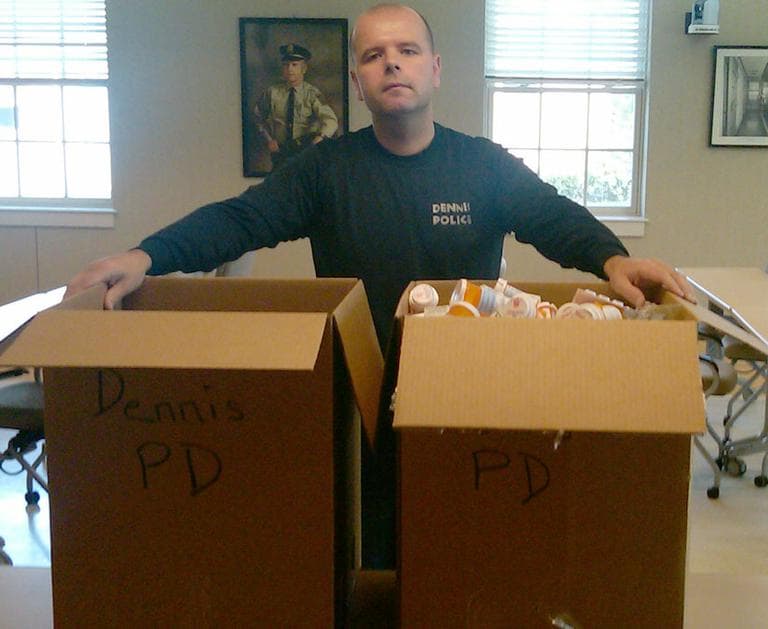Advertisement
Prescription Drugs Lead To Spike In Crime Rates
Police departments across Massachusetts are noticing a big jump in certain types of crime. Almost all of it, they say, is fueled by substance abuse. Police say the epidemic of substance abuse in a slow economy is a threat to public safety and some of the rules designed to crack down on substance abuse are leading more addicts to crime.

Reading Police Chief James Cormier recently brought this up during a meeting of police officials from across the state. He said there was unanimous agreement during that meeting that there were some dramatic increases in 2010 crime rates over the previous year.
"We had an increase in breaking and enterings — a combination of house breaks and car breaks — and when we put them together, they showed an increase of our previous four-to-five-year average from 50 to 200, which is a 200 percent increase," Cormier said.
Cormier, who is head of the Northeastern Massachusetts Law Enforcement Council, said police are noticing that thieves are primarily targeting homes during the day when people are out — or they're looking for valuables in cars parked at malls and fitness centers.
Many police departments also say the vast majority of these crimes are being committed by addicts trying to support their habits in a tough economy. Heroin is the substance of choice north of Boston, but to the south it's prescription drugs. Among the areas hardest hit by prescription drug abuse is Cape Cod, where the small pills are causing big problems.
"There's a direct correlation between prescription drugs and a rash of house and car breaks here."
Dennis Police Sgt. Cleve Daniels
"There's a direct correlation between prescription drugs and a rash of house and car breaks here," said Dennis Police Sgt. Cleve Daniels.
Daniels said addicts are stealing valuables to trade or sell for drugs, or they're breaking into homes just to raid medicine cabinets.
Daniels helped collect hundreds of pounds of unused prescription medicine during the National Prescription Drug Take-Back Day on April 30. Dennis was one of 173 sites in Massachusetts where residents dropped off their unused prescription drugs. More than 12,000 pounds of drugs were collected in Massachusetts — between 200 and 300 pounds was collected in Dennis alone.
Daniels said most of the drugs were turned in by residents who want to keep them away from the addicts targeting the area's empty summer houses and the homes of elderly residents.
Dennis patrolman Tim Downs said it's gotten to the point where some thieves actually know when people are getting their prescriptions refilled.
"We have one particular case that it appears that every time someone gets their medication they're getting broken into," Downs said.
The most popular pills on the Cape right now are 30 milligram Percocets, which are usually melted and then injected. They have a street value of about $30 a pill and an addict typically uses between four and eight pills a day. But Dennis police Det. Damon Reinhold said the addicts he's arresting are anything but typical.
"They seem to come from normal backgrounds — college kids, kids who were athletes in high school, kids who seemed to have everything together," Reinhold said. "When we do our search warrants we see these kids living in these deplorable conditions, and I mean deplorable — rental houses — it's like the stuff you see on TV, needles all over the floor, used needles everywhere, rubbish...they're flop houses."
Reinhold thinks the best way to address the problem is to mandate tougher jail sentences. But 20-year-old Clinton, a heroin addict who has been clean for the past two years but wanted his last name withheld, said authorities should crack down on the supply instead.
"I didn't know anybody who got their supply through prescriptions," Clinton said. "I knew people who would send a bunch of guys to Florida, maybe 10 guys who would go to the pill mills there. Then these guys would bring back 1,000 pills each, maybe more, and bring them directly to the Cape. That's how everyone who I knew was getting their supply."
Because prescription drug abuse is the nation's fastest growing drug problem, the state and federal governments are cracking down with prescription monitoring programs. Ironically, these programs could be contributing to the spike in crime. Police say if it's harder for addicts to get a doctor's prescription, they resort to doing whatever it takes to get the pills, which usually means criminal activity.
This program aired on May 9, 2011. The audio for this program is not available.
